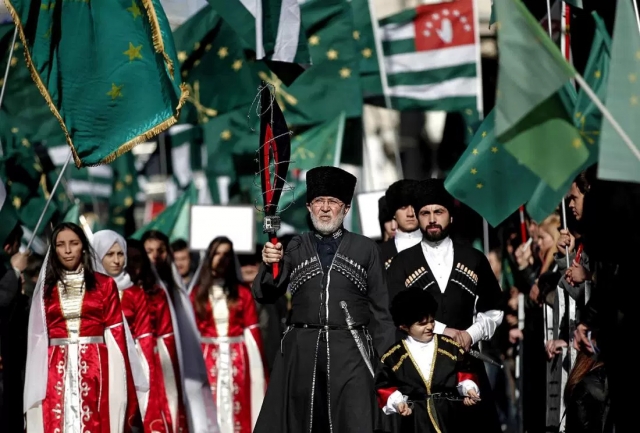Circassians Around the World Commemorate Genocide
"In this year of 1864, a deed has been accomplished that is almost without precedent in human history: not one of the mountaineer inhabitants remains on their former places of residence, and measures are being taken to cleanse the region to prepare it for the new Russian population." – General Staff of Imperial Russian Army in the Caucasus
TBILISI – Russia’s century-long conquest of the Caucasus was a gruesomely bloody affair that was often characterized by acts of unspeakable cruelty and a particular macabre obsession by the tsar’s armies to inflict the type of pain on their victims that would leave generations of local nationalities burning with a deep-rooted hatred for their Slavic conquerors.
Decades of brutal guerrilla warfare in the isolated mountains left whole swathes of the region in ruins as the Russians attempted to deny the warlike indigenous populations any safe haven from their marauding armies.
Five years after capturing Imam Shamil – the legendary fighter who led Chechen and Dagestani forces in an epic 25-year war of resistance against the Russians – the Russians finally subjugated the last remaining Caucasus people to resist tsarist rule in May 1864.
Collectively known as Circassians – or Cherkess – they were the North Caucasus’ largest ethnic group, stretching across southern Russia and the mountain regions of Adygea, Kabardino-Balkaria, Karachay–Cherkessia and Georgia’s Black Sea region of Abkhazia.
They put up stiff resistance to the far better equipped Imperial Russian Army. Like the Chechens under Shamil, the predominantly Muslim Circassians were master guerrilla fighters who used their knowledge of the terrain, superior skills with blades and legendary riding abilities to keep the Russians at bay for nearly 100 years.
Following their defeat, however, the entire population was either dispatched or deported en masse to the Ottoman Empire. According to official tsarist documents of the time, just over 400,000 Circassians were killed and 497,000 more were deported to modern-day Turkey and the Near East.
The survivors scattered across Anatolia and parts of the Levant, many of whom were welcomed by local authorities as fierce, loyal fighters. To this day, the royal guard of the Hashemite Dynasty of Jordan consists entirely of Circassians, all of who are direct descendants of those who survived Russia’s brutal ethnic cleansing campaign in the middle of the 19th century.
Russian officials and the overwhelming majority of academics in the country vehemently reject any claims that genocidal policies were ever a part of the strategy of the Imperial Russian Army when it conquered the Caucasus.
Much in the same vein as Turkey’s denial of the Armenian Genocide of 1915, the issue over the history of the Circassians remains a highly contentious political issue in Russia.
Vladimir Putin’s Russia has consistently tried to hide the scale of its cruelty towards groups like the Circassians by creating a wall of silence and denial about the 19th century Caucasus Wars.
Open discussions by Russian scholars are suppressed; no specific state commemorates the Circassian Genocide and Kremlin-loyalists in academia continue to invent new reasons that explain why the Circassians “voluntarily” joined the tsarist empire. This is all done while Russian officials continue to push their state-sponsored denial that Russia’s military leaders carried out against the people’s of the Caucasus.
Circassian activists were outraged that Putin’s government chose to build most of the 2014 Sochi Winter Olympics venues in Krasnaya Polyana, the site of a major massacre of Circassians in what was once the village of Atquaj on May 21, 1864.
The Russian government predictably ignored the Circassians’ demands to respect the memory of the site, but the six million-strong diaspora’s goal of drawing more attention to their cause was, by and large, successful.
Large-scale annual demonstrations demanding that Russia take responsibility for their actions grow with each passing year in Turkey, Jordan and Israel. Georgian officials are now expected to follow standard protocol by making a pilgrimage to the Circassian Cultural Center in Tbilisi to pay their respects.
Georgia was the first, and to-date, the only country in the world to officially declare the ethnic cleansing of Circassians an act of genocide.
Abkhazia, Georgia’s Moscow-backed separatist region on the Black Sea, has named May 21 a day of remembrance for the victims of the Caucasian War
Even in Russia, a rare crack in the Kremlin’s usual rhetoric appeared in the North Caucasus republic of Kabardino-Balkaria. The region’s governor declared May 21 Circassian Day and publically acknowledged that “certain hardships were endured” by the region’s previous inhabitants.
By Nicholas Waller












